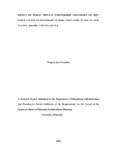| dc.contributor.author | Wagura, J. W | |
| dc.date.accessioned | 2017-01-10T08:25:12Z | |
| dc.date.available | 2017-01-10T08:25:12Z | |
| dc.date.issued | 2016 | |
| dc.identifier.uri | http://hdl.handle.net/11295/100134 | |
| dc.description.abstract | The purpose of the study was to investigate the effect of Public-Private Partnerships Strategies on access of the boy-child to secondary education in Kikuyu Sub county, Kiambu County, Kenya. Four objectives guided the study :To determine the extent to which the community is involved in construction and management of schools to enable the boy-child enrol in secondary school, the role of scholarships by private sector in enhancing accessibility to secondary school by the boy-child, to assess the effect of contracting of academic and professional services to private providers on enhancing access to secondary school by the boy-child and to determine effect of private sector’s involvement in provision of infrastructure on enhancing accessibility to secondary school by the boy-child. The study was based on the General Systems Theory. The target population was the 52 principals in the secondary schools in the sub county and the sub county education office. The study adopted a descriptive survey design using questionnaire as the major instrument for data collection from the principals and an interview guide for the sub county education office. Both descriptive and inferential statistics were further conducted in data analysis. Quantitative data was summarised using descriptive statistics of frequency tables, pie charts and percentages. Qualitative data was analysed by categorising and discussing responses from each item according to the theme and the results of the analysis were presented using frequency tables. Inferential statistics were on the other hand done to show the nature and magnitude of relationships established between the independent and dependent variables using regression analysis to make inferences from the data collected to more generalized conditions. The study found out that community involvement in the construction and management of school had an effect on boy child enrolment to secondary education. However communities need to take a bigger role on ensuring the boy-child is enrolled and retained in secondary school. On the role of scholarships by the private sector the study found out that though scholarships are available from the private sector not many boys are benefiting and the beneficiaries mainly get partial sponsorships. The private sector has also has been involved in the provision of physical facilities though not adequate it has an effect on the accessibility of the boy-child to secondary education in the sub county. This has gone a long way in supplementing the effort of the government and the county government through Constituency Development Fund .Contracting of educational and professional services was reported to have a positive impact on the access of the boy –child to secondary education in the sub county. This study therefore concluded that the role of the public private partnership is crucial if the access of the boy-child to secondary education is to be enhanced in the sub county | en_US |
| dc.language.iso | en | en_US |
| dc.publisher | University of Nairobi | en_US |
| dc.rights | Attribution-NonCommercial-NoDerivs 3.0 United States | * |
| dc.rights.uri | http://creativecommons.org/licenses/by-nc-nd/3.0/us/ | * |
| dc.subject | Effect Of Public Private Partnership Strategies On Boy-Child Access To Secondary School Education | en_US |
| dc.title | Effect Of Public Private Partnership Strategies On Boy-Child Access To Secondary School Education In Kikuyu Sub-County, Kiambu County, Kenya | en_US |
| dc.type | Thesis | en_US |



